Prep
Week 5, Term 3

Prep
Week 5, Term 3
INFORMATION
🤸♂️ Gymnastics - last session this week
We have our final gymnastics session on Wednesday, and the children have absolutely loved the experience. They’ve enjoyed the adventure of travelling by bus, as well as developing new gymnastics skills that challenged both their coordination and strength. Thank you for supporting your child throughout this fun and active learning experience.
🎭 Matilda Jr. Costume
Thank you to everyone who has already uploaded a photo of their child wearing their Matilda costume. If you haven’t done so yet, please upload it as soon as possible. You’ll find a pink folder in your child’s Showbie account labelled ‘Costume Photo – Matilda Jr.’ Tim and Kristy kindly ask that every Prep student’s costume photo is uploaded to this folder to help ensure all costumes are ready and suitable for the show. We appreciate your support in helping us prepare for a fantastic performance!
🎨 Specialist timetable - updated for Term 3
**Please note - Prep A and Prep C have new library days
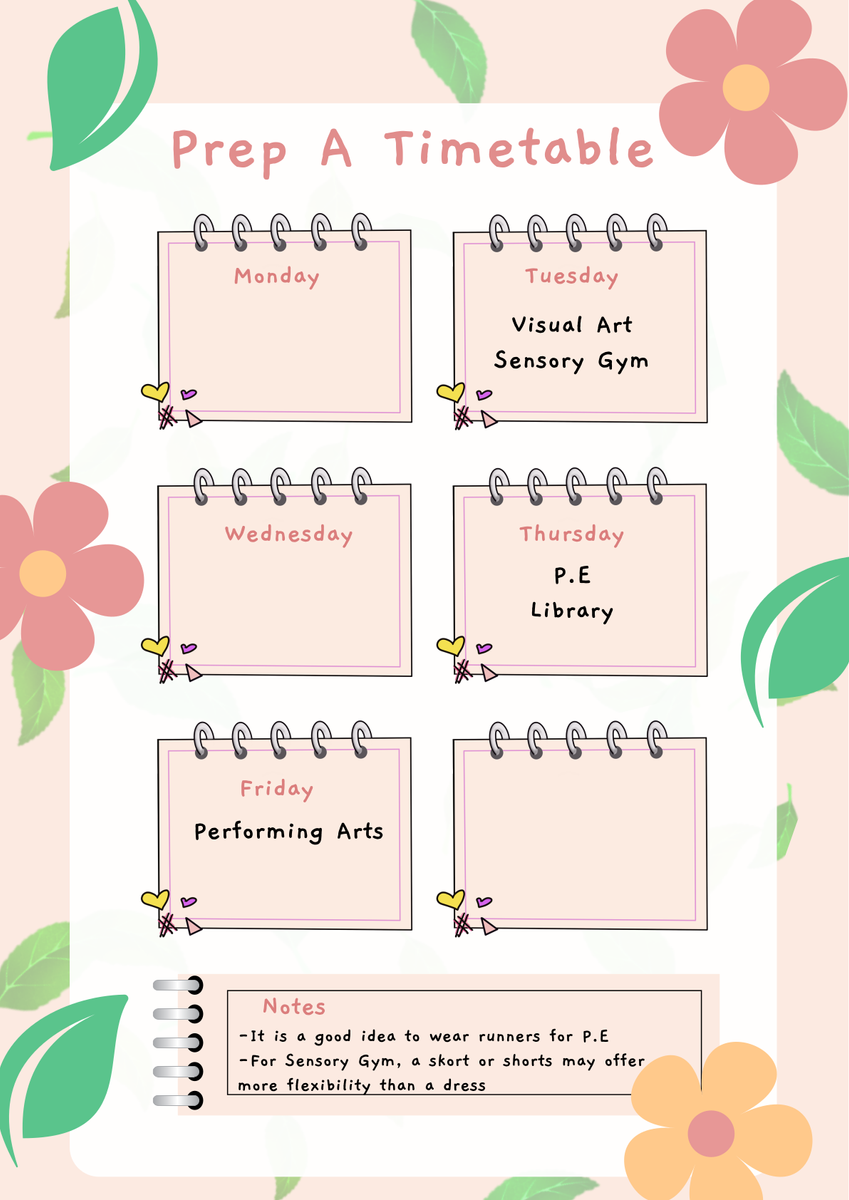
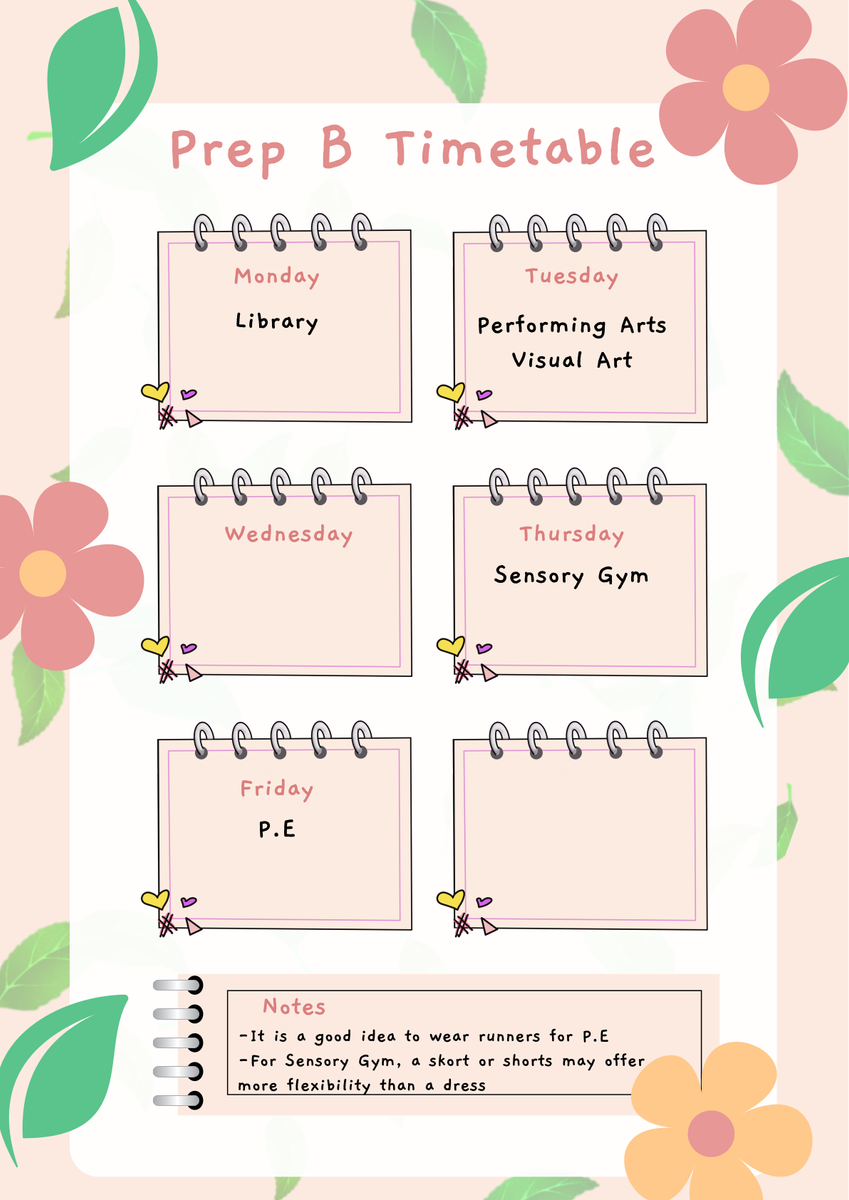
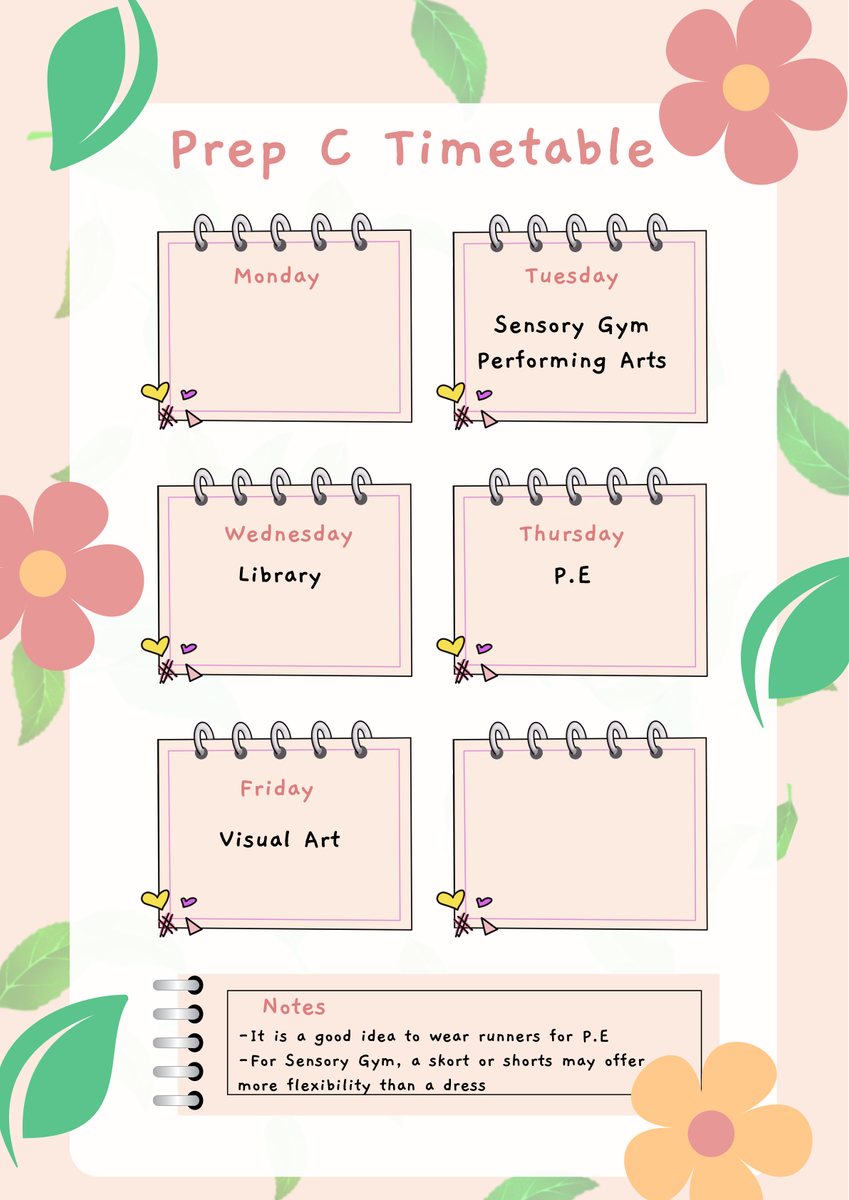



CURRICULUM
📚 Phonemic awareness: reading and phonics
In UFLI, we are beginning an exciting new concept - digraphs, where two letters work together to make a single sound. We will start by learning the grapheme -ck and how it is used at the end of a word immediately following a short vowel sound, before moving on to the sh digraph.
We’ll focus on:
• Learning the phonemes (the sounds the letters make)
• Practising the graphemes (how we write the letters with correct formation)
• Using the matching cued articulation actions to support sound recognition.
• Reading longer words (CVCC/CCVC words) like duck and ship.
We’ll also learn the Heart Words: goes, says, she and we
What can you do at home?
• Help your child read the take-home book, decodable passages and Heart Words from their book pocket. Aim for fluency by the second day of reading.
As your child reads, encourage them to recognise familiar words instantly and only sound out unfamiliar ones.
• Enjoy bedtime stories together to build vocabulary, comprehension, and a love of reading.
• If you're interested in learning more about Cued Articulation, you can watch this helpful video by Jane Passey (the founder), where she explains and demonstrates each sound: Cued Articulation with Jane Passey
• Work through the optional UFLI home pages if you’d like some extra phonics practise at home.
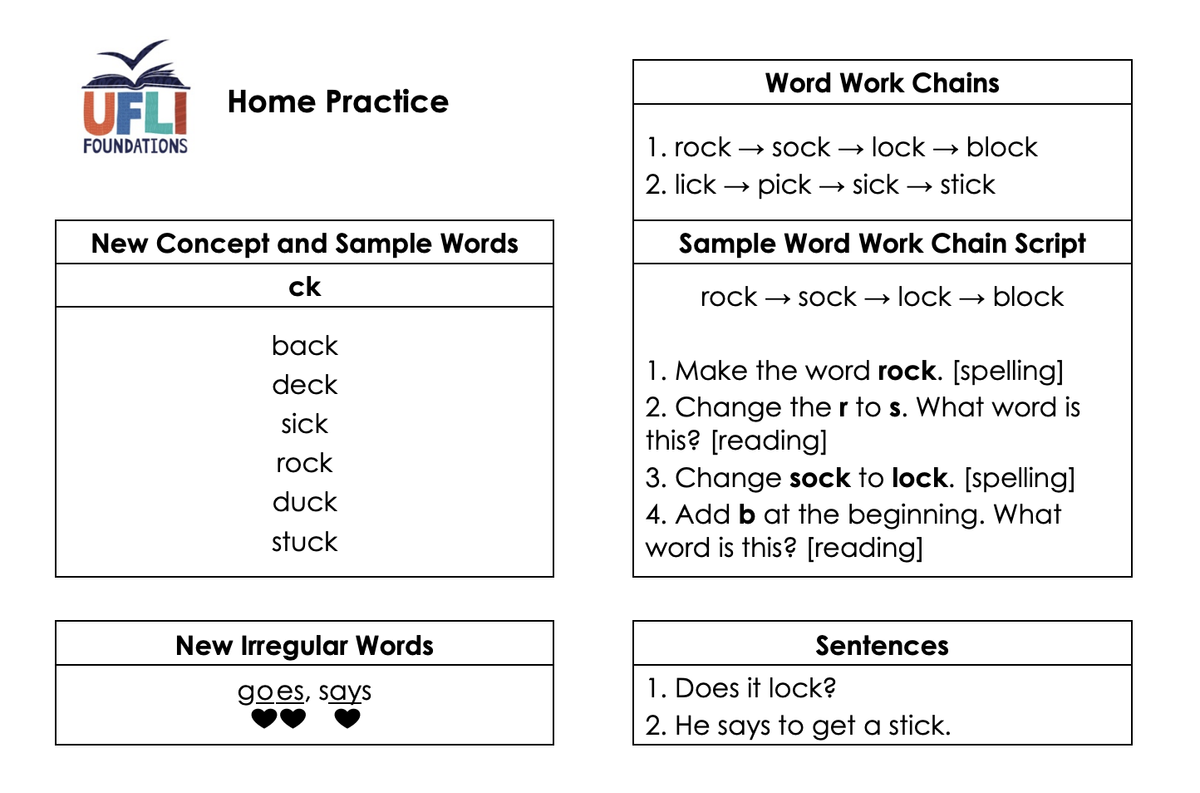
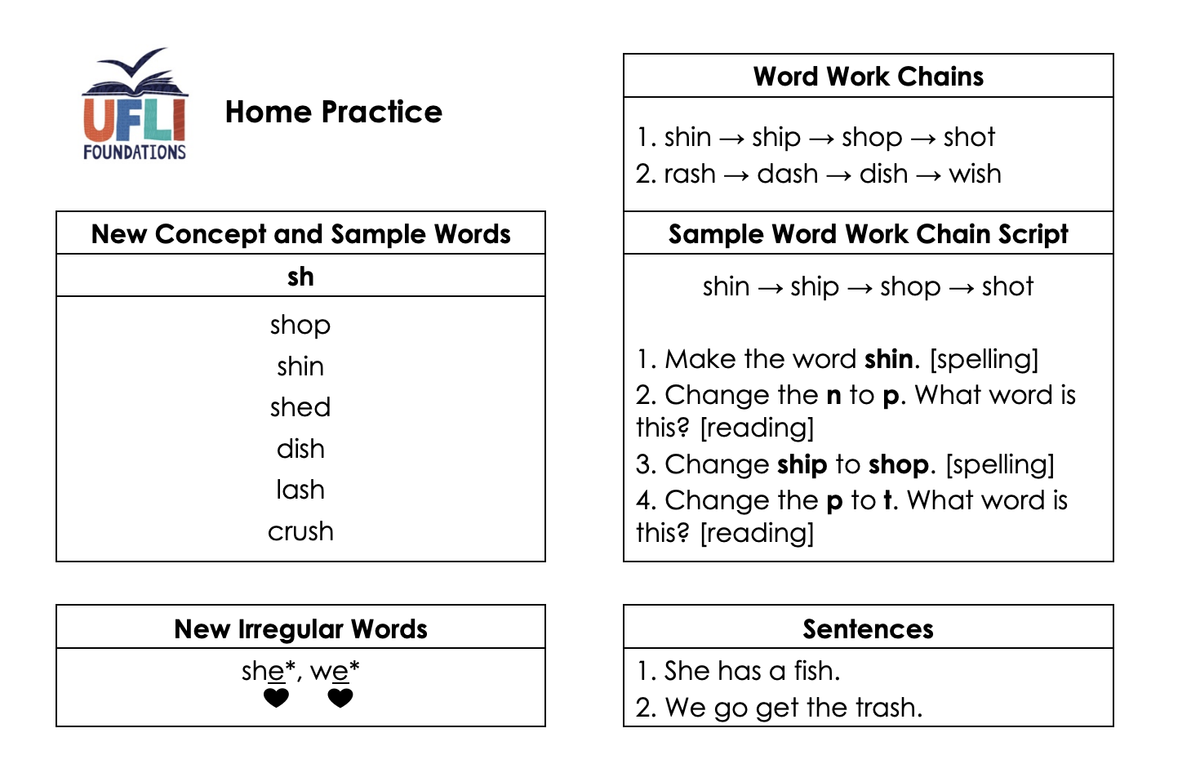


📝 Literature: reading responses and writing
Students are continuing to explore the history of Wonga Park through non-fiction texts. Since there isn’t an age-appropriate book about the arrival of electricity in Wonga Park and how it transformed daily life, Anita Beever has written a special mentor text for our students titled When Wonga Park Lit Up. This non-fiction text is presented in the style of a fiction book, making it both engaging and informative. Through this text, students will learn about the changes electricity brought to Wonga Park and share their opinion on whether it improved life for the people living there. They will also study the adjectives used in the book and practise adding their own adjectives to describe nouns.
Students will continue to develop their skills as independent writers by revising the correct formation of Boss letters and their related “cousins.” Boss letters are main letter shapes from which other letters are formed — for example, once students can write the Boss letter c, they can also form its related letters a, d, g, o, and q. During our Mentor Text lessons, students will create non-fiction statements while exploring the difference between facts and opinions. They will also practise using adjectives to describe nouns, completing this as both a spoken language activity and a written task.
What can you do at home?
• Practise writing all lower case letters of the alphabet, focusing on correct starting points and smooth movements.
• Look for nouns and verbs in books or around the house. Ask your child to name a noun (like dog) and a matching verb (like runs), then put them together in a simple sentence. Next, add an adjective to describe the noun for more detail — for example: "The fluffy dog runs".
• After reading a book together, ask your child to tell you one fact about the book and one opinion about the book.
• Play simple sentence-building games - give your child a noun and ask them to think of a verb to go with it, or vice versa.
• Practise writing the Heart Words, taking care to notice the tricky 'heart' parts in the word.
🔢 Maths
Students will be introduced to the concept of sharing and grouping. (NB* While this is the foundation of division, we will not be using that term with students yet.) Throughout the week, students will explore identifying equal shares, sharing equally between two and three sharing equally with one left over, and recognising amounts that can be shared equally into two groups. These concepts will be taught using counters and other hands-on materials, allowing students to physically share and group objects to deepen their understanding.
What can you do at home?
• Share snacks equally by giving your child a small number of items and ask them to share them equally between two or three people.
• Use toys for sharing – practise dividing Lego pieces, cars or blocks evenly between groups.
• Play ‘share the treasure’ - pretend coins or counters are treasure and take turns sharing them equally into piles.
• Ask “is it fair?” questions – after sharing, talk about whether each group has the same number, and if not, why.
• Involve them in real-life tasks – let your child help share out cutlery, napkins or serving portions at mealtimes so everyone has the same amount.
🌏 CBL - Change
Students will complete most of their learning during Mentor Text sessions, using the specially written non-fiction text about when electricity came to Wonga Park. This text will guide them in exploring the Essential Question: What big changes have happened in Wonga Park, and how did they make life different? To bring the history to life, we will also play a range of ‘old-fashioned’ games, such as jacks, hopscotch, marbles, and skipping.
🫶🏼 Respectful Relationships
Students will take part in a lesson called Friendly or Unfriendly Decisions. They will explore what makes actions and choices friendly or unfriendly, and how these behaviours can impact others.